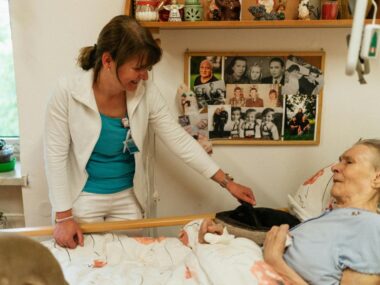Nursing professionals from all over the world are drawn to Australia because of its great healthcare system and high standard of living. Australia has many chances for nurses, including visa sponsorship, as a result of its aging population and growing need for qualified healthcare professionals. This article explores the range of nursing positions available in Australia, how to get a job with a sponsored visa, and advice for a smooth transition to working there.
Overview Of The Australian Healthcare System
The public and private sectors make up Australia’s hybrid healthcare system. Residents have access to a variety of health services through Medicare, the public health insurance program, while private healthcare institutions provide more choices. The system’s focus on speed and high-quality care generates a strong need for trained medical personnel, particularly nurses.
Demand for Nurses in Australia
The Australian healthcare industry faces a shortage of skilled nurses due to:
The aging population requires increased medical care.
The expansion of healthcare services in rural and remote areas.
A growing need for specialized nursing roles in areas such as mental health, aged care, and critical care.
This shortage has prompted employers to recruit internationally and offer visa sponsorships to attract skilled nurses.
Types of Nursing Jobs in Australia
Nursing is a diverse and rewarding profession in Australia, offering opportunities across various specialties. Below is an overview of the different types of nursing jobs in Australia:
1. Registered Nurse (RN)
Role: Provide direct patient care, administer medications, and coordinate with healthcare teams.
Work Settings: Hospitals, clinics, nursing homes, schools, and community health centers.
Specialties:
- Medical-surgical nursing
- Emergency and trauma care
- Oncology
- Pediatric Nursing
- Aged care
2. Enrolled Nurse (EN)
Role: Work under the supervision of RNs to provide basic nursing care, assist with patient hygiene, and administer medications (with additional training).
Work Settings: Hospitals, aged care facilities, and rehabilitation centers.
Training: Requires a Diploma of Nursing.
3. Nurse Practitioner (NP)
Role: Advanced practice nurses who can diagnose illnesses, prescribe medications, and manage patient care independently.
Specialties:
- Primary health care
- Mental health
- Acute care
Training: Requires a Master’s degree and additional accreditation.
4. Aged Care Nurse
Role: Provide care to elderly patients in nursing homes, community settings, or private residences.
Key Responsibilities: Managing chronic illnesses, assisting with mobility, and offering emotional support.
5. Mental Health Nurse
Role: Specialize in caring for patients with mental health conditions.
Work Settings: Psychiatric hospitals, community mental health centers, and private practices.
Special Skills: Strong communication and crisis management.
6. Midwife
Role: Specialize in pregnancy, childbirth, and postpartum care.
Work Settings: Hospitals, maternity clinics, and home birth services.
Training: A Bachelor of Midwifery or a dual degree in Nursing and Midwifery.
7. Community Health Nurse
Role: Focus on health promotion and disease prevention in communities.
Work Settings: Schools, community clinics, and outreach programs.
Special Tasks: Educating communities on health risks, conducting immunization programs, and offering primary care.
8. Critical Care and ICU Nurse
Role: Care for critically ill or injured patients in intensive care units (ICU).
Skills Required: Advanced technical skills, quick decision-making, and emotional resilience.
9. Perioperative Nurse (Theatre Nurse)
Role: Assist in surgical procedures by preparing operating rooms, sterilizing equipment, and supporting surgeons.
Specialties:
- Scrub nurse
- Circulating nurse
- Recovery nurse
10. Remote and Rural Nurse
Role: Provide healthcare services in isolated or rural areas where medical resources are limited.
Key Responsibilities: General nursing care, emergency response, and health education.
Challenges: Limited resources and working in multidisciplinary roles.
11. Pediatric Nurse
Role: Specialize in caring for children and adolescents.
Work Settings: Children’s hospitals, pediatric clinics, and schools.
Skills Required: Patience, adaptability, and child-friendly communication.
12. Public Health Nurse
Role: Focus on promoting health and well-being at a population level.
Work Settings: Government agencies, non-profits, and public health campaigns.
Key Responsibilities: Health policy advocacy and program implementation.
13. Oncology Nurse
Role: Care for patients undergoing cancer treatment.
Special Skills: Administer chemotherapy, manage pain, and provide emotional support.
14. Neonatal Nurse
Role: Provide specialized care for premature and critically ill newborns.
Work Settings: Neonatal intensive care units (NICUs).
15. School Nurse
Role: Offer healthcare services within educational institutions.
Key Responsibilities: Managing student health, administering first aid, and promoting health education.
16. Travel Nurse
Role: Temporary nursing assignments in various locations, often addressing shortages.
Benefits: Flexibility and opportunities to work in different regions.
Visa Sponsorship Opportunities for Nurses
For nurses with foreign training, Australia provides several immigration pathways, frequently with employer sponsorship. Among the main visa classifications are:
- Temporary Skill Shortage (TSS) Visa (Subclass 482)
Skilled workers can stay and work in Australia for up to four years with this employer-sponsored visa. In addition to having a legitimate work offer from an Australian company, nurses must possess the abilities and credentials needed for their position.
- Skilled Independent Visa (Subclass 189)
This visa is available to nurses who meet the requirements based on their qualifications and experience, even though it is not directly related to employer sponsorship.
- Employer Nomination Scheme (ENS) Visa (Subclass 186)
This permanent visa allows skilled workers to live and work in Australia indefinitely. Employers sponsor this visa for eligible nurses.
- Regional Sponsored Migration Scheme (RSMS) Visa (Subclass 187)
This visa is for nurses willing to work in regional or remote areas. It provides permanent residency and often includes incentives for relocating to less populated regions.
Eligibility Requirements for International Nurses
To work as a nurse in Australia, you must meet specific eligibility criteria:
AHPRA Registration
The Australian Health Practitioner Regulation Agency (AHPRA) regulates nursing practice. International nurses must obtain registration by meeting qualifications, English language proficiency, and other requirements.
Educational Qualifications
A recognized nursing degree or diploma equivalent to Australian standards is essential.
English Language Proficiency
International nurses must demonstrate English proficiency through tests like IELTS, OET, or PTE. Generally, a score of 7.0 in IELTS (Academic) or equivalent is required.
Work Experience
While not mandatory for all roles, prior nursing experience enhances your employability and helps you meet visa requirements.
How to Find Nursing Jobs with Visa Sponsorship
Strategic planning, in-depth research, and comprehension of immigration procedures are necessary to land nursing employment in Australia with a sponsored visa. Here are comprehensive instructions and useful advice to help you:
1. Understand Visa Requirements
Skilled Migration Visa: Many healthcare professionals, including nurses, qualify under Australia’s skilled migration programs (e.g., Subclass 482 – Temporary Skill Shortage Visa, Subclass 186 – Employer Nomination Scheme).
Eligibility Criteria: Check the Australian Department of Home Affairs website for requirements, including qualifications, English proficiency, and professional registration.
2. Verify Your Qualifications
Nurses must meet the standards of the Australian Health Practitioner Regulation Agency (AHPRA).
Complete the following:
Skill Assessment: Through the Nursing and Midwifery Board of Australia (NMBA).
English Proficiency Test: IELTS, OET, or PTE Academic scores are typically required.
Bridging programs may be needed for foreign qualifications to align with Australian standards.
3. Search for Employers Offering Sponsorship
Job Portals: Websites such as Seek, Indeed, and LinkedIn often list nursing jobs with visa sponsorship.
Healthcare Networks: Explore careers at organizations like:
- Ramsay Health Care
- Healthscope
- Bupa
Government Roles: Check for opportunities in public hospitals via state health websites (e.g., NSW Health, Queensland Health).
4. Leverage Recruitment Agencies
Agencies specialize in placing international nurses in Australian roles. Examples include:
- Healthcare Australia
- Medacs Healthcare
- Global Nurse Force
These agencies assist with job placement and visa processing.
5. Focus on High-Demand Specializations
Areas like aged care, critical care, mental health, and rural nursing often have a higher demand for international professionals.
Employers in regional or remote areas may offer additional incentives, including visa sponsorship.
6. Network and Engage with Professionals
Join nursing forums and associations like the Australian Nursing & Midwifery Federation (ANMF).
Attend virtual and in-person job fairs or seminars tailored for international healthcare professionals.
7. Prepare a Strong Application
Highlight your skills, certifications, and willingness to relocate.
Customize your CV to align with Australian healthcare standards.
Include a clear statement about your interest in visa sponsorship.
8. Understand Employer Expectations
Employers often look for nurses who:
- Have valid AHPRA registration.
- Commit to a specific duration of employment.
- Demonstrate adaptability to Australian healthcare systems.
9. Explore Regional Pathways
Australia’s Regional Migration Program encourages skilled workers to move to less-populated areas.
Check out visa options like Subclass 491 (Skilled Work Regional Visa).
10. Apply Directly
Direct applications for sponsorship positions are accepted by a large number of Australian healthcare businesses. Check their career pages frequently and send in applications that are well-prepared.
11. Stay Updated
Healthcare regulations and immigration legislation are subject to regular changes. Sign up to receive updates from professional nursing associations and the Australian Department of Home Affairs.
Benefits of Nursing Jobs in Australia
Australia is a popular destination for nurses from all over the world because of its well-known and excellent healthcare system. The following are the main advantages of being a nurse in Australia:
1. Competitive Salary and Benefits
In Australia, nurses receive competitive pay that is frequently topped off with several benefits, such as:
- Overtime pay for extended hours or night shifts.
- Allowances for working in rural or remote areas.
- Annual leave loading—an additional percentage added to base salary during vacation periods.
2. High Demand and Job Security
Australia is constantly in need of medical personnel due to:
- An aging population.
- Expanding healthcare infrastructure.
- Growth in specialized nursing fields. This demand ensures job stability and opportunities for advancement.
3. Diverse Career Opportunities
Nurses in Australia can specialize in various fields, including:
- Critical Care Nursing.
- Pediatric Nursing.
- Mental Health Nursing.
- Aged Care and Palliative Care. This diversity allows nurses to pursue their interests and grow professionally.
4. Pathways for Permanent Residency
Australia provides visa sponsorship opportunities for skilled nurses through programs like:
- Temporary Skill Shortage Visa (TSS).
- Employer Nomination Scheme (ENS).
- Regional Sponsored Migration Scheme (RSMS). These pathways often lead to permanent residency, offering long-term stability and benefits.
5. Advanced Healthcare System
Australia’s healthcare system is among the best globally, providing nurses access to:
- Advanced medical technologies.
- State-of-the-art facilities.
- Ongoing professional development and training opportunities.
6. Support for International Nurses
Australia offers robust support for international nurses, including:
- Assistance with the AHPRA registration process.
- Bridging programs for overseas-qualified nurses.
- Orientation programs to help with the transition to the Australian healthcare environment.
7. Work-Life Balance
Australian workplaces emphasize maintaining a healthy work-life balance by offering:
- Flexible work schedules.
- Generous annual leave (four weeks or more).
- Paid parental leave and sick leave.
8. High Quality of Life
Living in Australia offers numerous lifestyle benefits, such as:
- Safe and multicultural communities.
- Access to beautiful landscapes, beaches, and national parks.
- A strong education system and public services.
9. Opportunities for Continuous Learning
Nurses in Australia are encouraged to upskill through:
- Employer-sponsored training programs.
- Scholarships for postgraduate studies.
- Conferences and workshops to stay updated on industry trends.
10. Ethical Work Environment
Australian healthcare adheres to stringent ethical standards, ensuring:
- Patient-centered care.
- Safe working conditions.
- Fair treatment and equal opportunities for employees.
Challenges and Tips for Success
Even while nursing in Australia is fulfilling, there are obstacles to overcome, like adjusting to a new culture, fulfilling strict registration requirements, and moving. Here are some pointers:
Understand the Licensing Process
Thoroughly research AHPRA registration requirements and ensure all documentation is in order.
Enhance Your Skills
Pursue additional certifications or training in high-demand specialties to increase your employability.
Seek Support Networks
Connect with fellow nurses and professional organizations to build a supportive network.
Prepare Financially
Relocation and licensing processes can be costly. Plan your finances to manage these expenses effectively.
FAQs About Nursing Jobs In Australia
Q: Is there an age limit for nurses seeking visa sponsorship in Australia?
A: While there is no age limit for nursing jobs, certain visa categories may have age restrictions, typically under 45 years.
Q: Can I bring my family with me on a sponsored visa?
A: Yes, most sponsored visas allow you to include family members as dependents.
Q: Are there opportunities in rural areas?
A: Yes, rural and regional areas often offer incentives for nurses, including relocation packages and faster pathways to permanent residency.
Conclusion
International professionals have a fantastic opportunity to work as nurses in Australia with sponsored visas. Australia is a great place for anyone looking to advance their careers and improve their quality of life because of its high demand for qualified nurses, welcoming immigration laws, and many perks. You can start a successful nursing career in Australia by being aware of the prerequisites, looking into employment openings, and being well-prepared.






